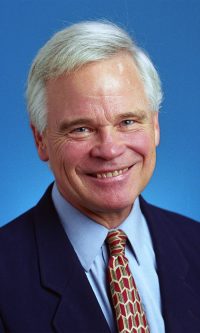DG MARTIN COLUMN: Still writing compelling history — on his 100th birthday
When UNC-Chapel Hill Professor William Leuchtenburg delivered the Law Day address in Mecklenburg County 35 years ago, I could not have dreamed that I would help celebrate his 100th birthday last week.

D.G. Martin
Or that I would remember the substance of that speech all these years later.
Leuchtenburg is a leading expert on the presidency of Franklin Roosevelt and on the presidency in general, as a tribute published by the UNC-Chapel Hill history department explained:
“Leuchtenburg became a leading scholar of twentieth-century U.S. history and the American presidency and the preeminent expert on FDR, writing profoundly influential books including ‘The Perils of Prosperity, 1914–32.’ ”
The tribute noted that his “Franklin D. Roosevelt and the New Deal, 1932-1940” won both the prestigious Bancroft Prize and the Francis Parkman Prize” and remains “the best single volume treatment of the subject. His later publications have constantly enhanced his historical influence and stature.”
Amazingly, Leuchtenburg is still writing, working on a history of presidents from George Washington to Teddy Roosevelt.
What was the topic of the Mecklenburg Law Day address that so captivated me? It was one that is timely today: “court packing.”
Leuchtenburg returned to the court packing topic in an article in the May 2005 “Smithsonian Magazine” titled “When Franklin Roosevelt Clashed with the Supreme Court — and Lost.”
In 1936 Franklin Roosevelt was overwhelmingly elected to a second term. Leuchtenburg described FDR’s elation and despair: “As the first election returns reached his family estate in Hyde Park, New York, on a November night in 1936, Franklin Delano Roosevelt leaned back in his wheelchair, his signature cigarette holder at a cocky angle, blew a smoke ring and cried ‘Wow!’ His huge margin in New Haven signaled that he was being swept into a second term in the White House with the largest popular vote in history at the time and the best showing in the electoral college since James Monroe ran unopposed in 1820.”
Leuchtenburg pointed out that in his first term, FDR secured congressional approval for a host of programs to overcome the Depression including a “cavalcade of alphabet agencies.”
But the court “struck down more significant acts of Congress — including the two foundation stones, the NRA (National Reconstruction Administration) and the AAA (Agricultural Adjustment Administration), of Roosevelt’s program — than at any other time in the nation’s history, before or since.”
However, as Leuchtenburg explained, the election-night jubilation “was tempered by an inescapable fear — that the U.S. Supreme Court might undo Roosevelt’s accomplishments.”
By February of the next year Roosevelt was ready to act. He “shocked Congress, his closest advisers, and the country by unleashing a thunderbolt. He asked Congress to empower him to appoint an additional justice for any member of the court over age 70 who did not retire. He sought to name as many as six additional Supreme Court justices, as well as up to 44 judges to the lower federal courts.”
Leuchtenburg continued, “Roosevelt’s message touched off the greatest struggle in our history among the three branches of government. It also triggered the most intense debate about constitutional issues since the earliest weeks of the Republic. For 168 days, the country was mesmerized by the controversy, which dominated newspaper headlines, radio broadcasts and newsreels, and spurred countless rallies in towns from New England to the Pacific Coast. Members of Congress were so deluged by mail that they could not read most of it, let alone respond.”
Meanwhile the Supreme Court backed away from declaring FDR’s programs unconstitutional, and one judge who had opposed FDR’s programs announced his retirement. With those developments, support for FDR’s court proposal evaporated. On July 22, 1937, the Senate buried it.
“A switch in time saved nine” some observers quipped.
Summing up, Leuchtenburg wrote, “The 168-day contest also has bequeathed some salutary lessons. It instructs presidents to think twice before tampering with the Supreme Court.”
President Biden should be listening.
“At the same time,” Leuchtenburg wrote, “it teaches the justices that if they unreasonably impede the functioning of the democratic branches, they may precipitate a crisis with unpredictable consequences.”
Members of the Supreme Court should take note.
D.G. Martin, a lawyer, served as UNC-System’s vice president for public affairs and hosted PBS-NC’s “North Carolina Bookwatch.”

